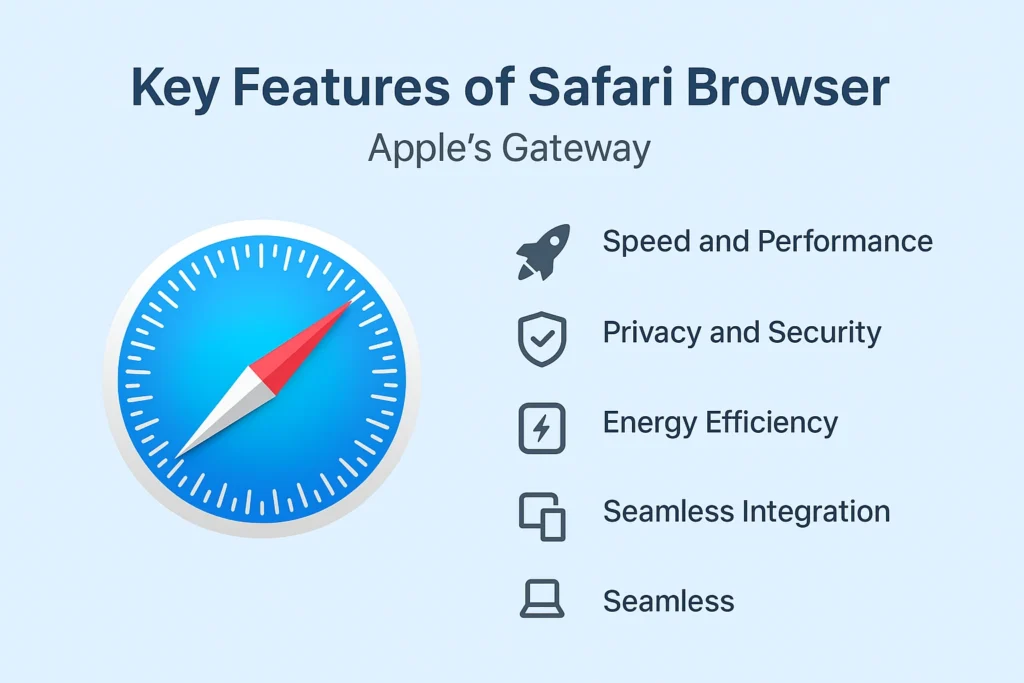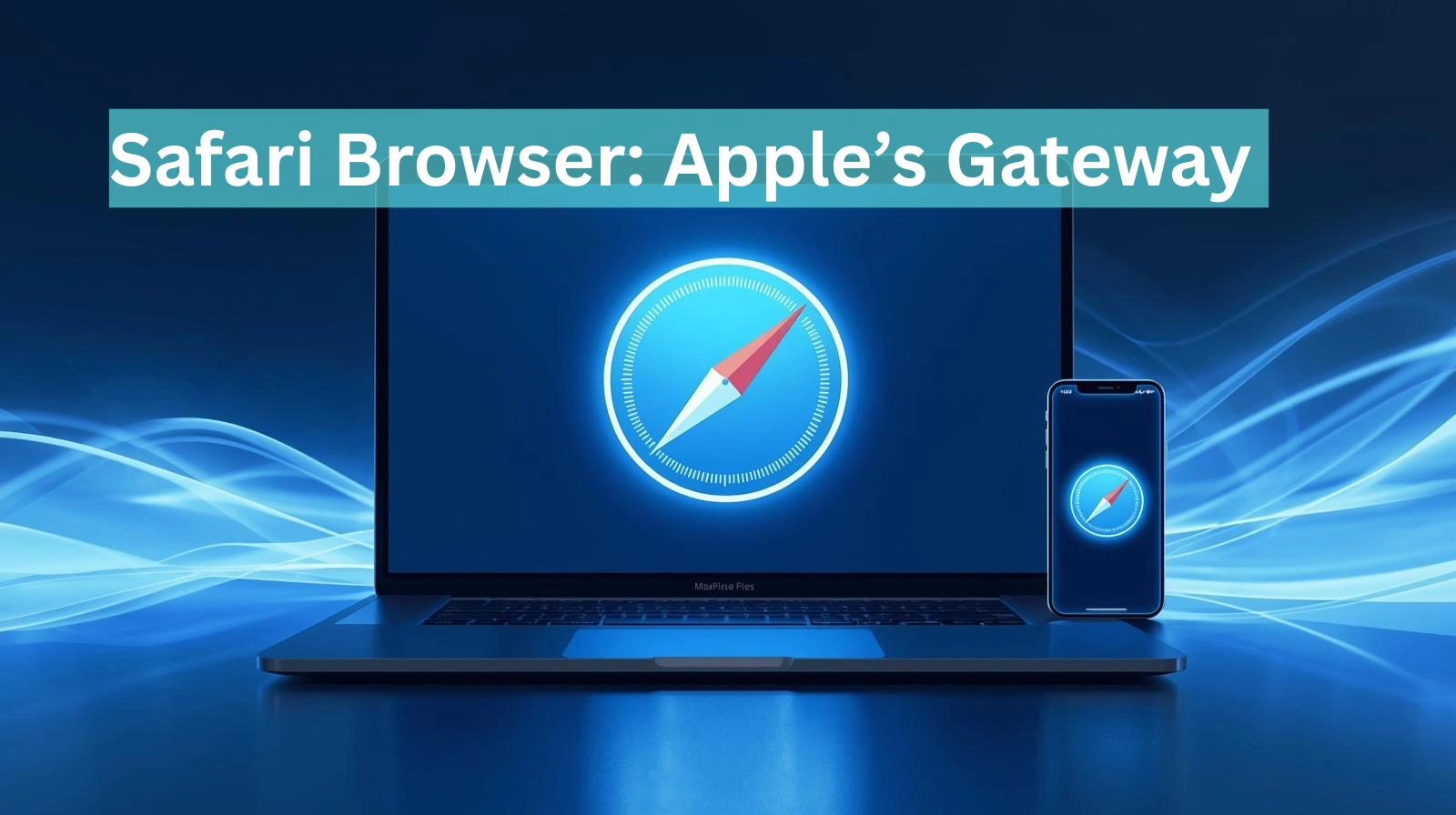Safari Browser: Apple’s Gateway to a Faster, Smarter Web Experience
When you think of Apple products, sleek design and smooth performance probably come to mind. The Safari browser is no exception. First launched in 2003, Safari has grown into Apple’s default window to the web—and while it doesn’t try to compete on every device like Chrome or Firefox, it plays to its strengths where it matters most: inside the Apple ecosystem.
So, what makes Safari stand out? Let’s break it down.
Why Safari Feels Different
Unlike most browsers that try to be “everything for everyone,” Safari is built with Apple users in mind. On a MacBook or iPhone, it feels noticeably faster and lighter than alternatives. That’s because Apple designs Safari hand-in-hand with its hardware, squeezing out every bit of efficiency.
But the real magic is in the little details:
- iCloud Syncing – Open a tab on your iPhone, and it’s already waiting on your Mac. Bookmarks, saved passwords, and even reading lists follow you everywhere.
- Energy Efficiency – If you’ve ever noticed your battery lasts longer on Safari than Chrome, you’re not imagining it. Apple tunes Safari to sip power, not guzzle it.
- Privacy First – Features like Intelligent Tracking Prevention and fingerprinting protection stop advertisers from following you around the internet.
In short, Safari isn’t trying to be the “global browser.” It’s more like a finely tuned sports car built for Apple roads.
Key Features That Make Browsing Easier

Safari packs in a lot of tools that many users don’t fully explore. A few worth calling out:
- Tab Groups & Profiles – Keep your work, personal browsing, and research separate. No more mixing vacation planning tabs with office spreadsheets.
- Custom Start Page – Add your favorite sites, background image, and Siri suggestions to create a browsing hub that feels personal.
- Extensions – While Safari’s extension library is smaller than Chrome’s, it’s growing fast, and Apple ensures tighter security for everything available.
- Web Apps – Save a website as an app on your Dock or iPhone home screen—handy for apps like Notion or Slack.
Safari Browser vs. Other Browsers
If you’re comparing Safari to Chrome, Firefox, or Edge, here’s the reality:
- Against Chrome: Safari wins on battery life and speed on Apple devices, but Chrome dominates with its cross-platform reach and massive extension library.
- Against Firefox: Firefox is loved for privacy and open-source values. Safari, however, edges ahead for Apple ecosystem integration.
- Against Edge: Microsoft’s Edge is packed with AI features and customization. Safari lags here, but Apple is slowly introducing AI-powered browsing tools.
So, if you’re all-in on Apple, Safari browser is tough to beat. But if you’re juggling multiple platforms, Chrome or Firefox might feel more flexible.
Making the Most of Safari
Want to use Safari like a pro? Try these tips:
- Pin Tabs – Keep your most-used sites (like email or messaging apps) always visible.
- Reader Mode – Strip away ads and clutter to focus on pure text. Perfect for distraction-free reading.
- Auto-Close Tabs – Let Safari automatically clean up old tabs after a day, week, or month.
- Instant Translation – Translate whole webpages with a single click, right from the address bar.
- Privacy Report – Curious who’s trying to track you? Safari shows exactly which trackers got blocked.
Looking Ahead: The Future of Safari Browser
Apple isn’t standing still. The company has already teased updates that lean heavily on AI, smarter privacy tools, and a refreshed design language called Liquid Glass. Expect Safari to feel even more seamless across iPhone, iPad, and Mac in the next couple of years.
The question is: can Safari expand beyond Apple’s walls, or will it remain a brilliant—but exclusive—tool for the Apple faithful?
Conclusion
At its core, the Safari browser is about balance. It gives Apple users speed, privacy, and efficiency without overwhelming them with endless menus and features. The trade-off is that it works best only if you stay inside Apple’s ecosystem.
Think of it this way: Chrome is the universal passport to the internet, but Safari is the VIP lounge—sleek, efficient, and designed for a specific crowd. If you’re an Apple user, Safari isn’t just another browser—it’s the one built for you.
FAQs
1. What makes Safari browser different from other browsers?
Safari is designed specifically for Apple devices, which makes it faster, more energy-efficient, and better integrated with iCloud compared to cross-platform browsers like Chrome or Firefox.
2. Is Safari browser safer than Chrome?
Yes, Safari emphasizes privacy with features like Intelligent Tracking Prevention, fingerprinting protection, and automatic HTTPS upgrades. While Chrome offers more extensions, Safari is often considered more secure for Apple users.
3. Can I use Safari on Windows or Android?
Currently, Safari is limited to Apple devices (Mac, iPhone, iPad). Apple discontinued Safari for Windows years ago, and it’s not available for Android.
4. How do I make Safari Browser run faster?
You can speed up Safari by clearing cache and browsing data, disabling unused extensions, and updating your device’s software. On Macs, closing unused tabs also improves performance.
5. Does Safari support extensions like Chrome?
Yes, Safari supports extensions through the App Store. While the selection is smaller than Chrome’s, Apple ensures strict security checks for safer browsing.







